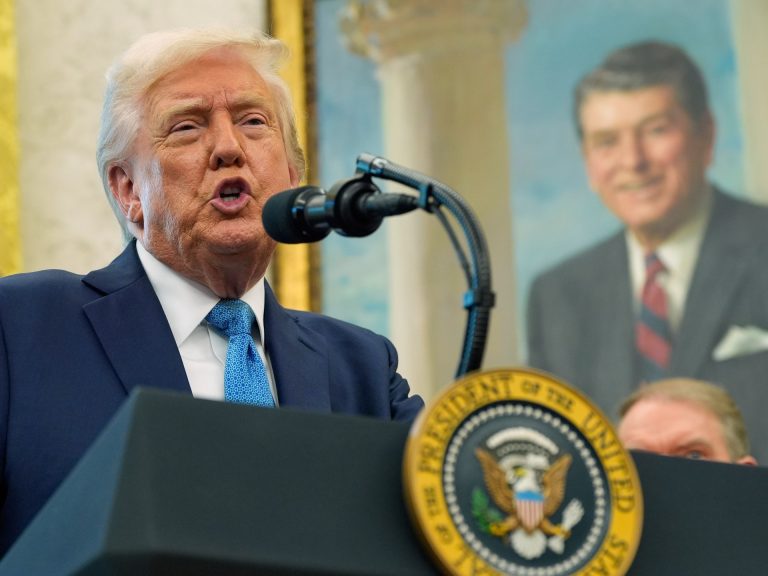United States President Donald Trump has backed off his threat to fire the head of the US Federal Reserve, after his broadsides against the central bank boss prompted a plunge in the stock market and the dollar.
Trump’s comments on Tuesday appeared to rule out any imminent plans to remove Federal Reserve Chair Jerome Powell, whom the US president has repeatedly criticised for not moving faster to lower interest rates.
“The press runs away with things. I have no intention of firing him,” Trump told reporters at the White House.
“I would like to see him be a little more active in terms of his idea to lower interest rates. This is the perfect time to lower interest rates. If he doesn’t, is it the end? No, it’s not.”
US stock futures, which are traded outside of regular market hours, surged following Trump’s comments, with contracts linked to the benchmark S&P 500 and tech-heavy Nasdaq-100 rising more than 1.70 percent and 1.90 percent, respectively.
The US dollar rose more than 1 percent against major currencies.
Wall Street rallied earlier on Tuesday after US Treasury Secretary Scott Bessent told an investors conference that a trade war with China was “unsustainable” and he expected the sides to de-escalate tensions and reach a deal at some point.
Following Bessent’s remarks, White House Press Secretary Karoline Leavitt said the Trump administration was “setting the stage for a deal with China” and “doing very well” in making progress towards an agreement.
The S&P 500 closed up more than 2.5 percent, while the Nasdaq finished more than 2.7 percent higher.
Asian markets opened higher on Wednesday, with Japan’s Nikkei 225 and South Korea’s KOSPI up about 2 percent and 1 percent, respectively, in early trading.
The US and China are locked in an effective trade embargo after Trump imposed a 145 percent tariff on most Chinese goods, and China slapped a 125 percent duty on US exports in retaliation.
Trump on Tuesday acknowledged that the tariff on China was “very high” and said the rate would “come down substantially”.
Trump’s repeated attacks on Powell have unnerved financial markets in recent days, given the broad economic consensus that the independence of the Federal Reserve is crucial to the health of the world’s top economy.
Wall Street suffered some of its steepest losses of the year on Monday after Trump branded Powell a “major loser” and “Mr Too Late” for not backing cuts in the benchmark interest rate, which influences borrowing costs across the economy.
Trump’s comments came after he last week declared that Powell’s termination “cannot come fast enough” and his top economic adviser, Kevin Hassett, said the administration was studying the possibility of his removal.
The Federal Reserve, which last cut the benchmark rate in December, has expressed caution about lowering borrowing costs in the near term amid concerns that Trump’s sweeping tariffs will stoke inflation.
Trump has dismissed concerns that his trade war will lead to higher prices, contrary to the views of most economists, and argued that the central bank’s cautious stance risks slowing the economy.
Powell, who was nominated by Trump in 2017 and tapped to serve another four-year term by former US President Joe Biden, has said he would not resign if asked and stated that he can only be removed for malfeasance.
The heads of independent federal agencies such as the Federal Reserve can only be dismissed for “cause” under legal precedent set by the US Supreme Court, though the Trump administration is currently challenging that norm in court in a case involving the Merit Systems Protection Board and the National Labor Relations Board.
Any move to remove Powell before the end of his term would likely send shockwaves through financial markets given the longstanding expectation that the Federal Reserve should make its decisions free of political considerations.
“I would expect to see a dramatic fall in the stock and bond markets,” Erasmus Kersting, an economics professor at Villanova University in Villanova, Pennsylvania, told Al Jazeera.
“The ‘sell USA’ strategy would become mainstream. This would also have an impact on the real economy, leading to a recession.”


